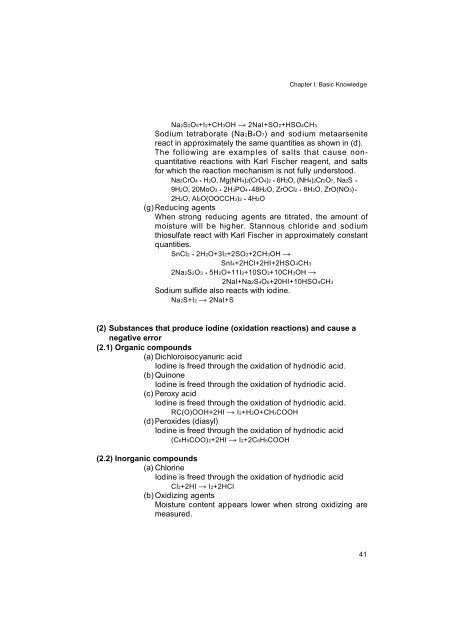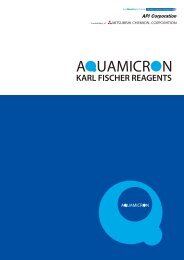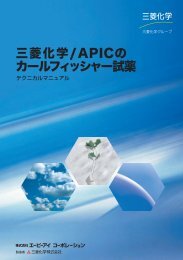Development of Karl Fischer Reagents
Development of Karl Fischer Reagents
Development of Karl Fischer Reagents
You also want an ePaper? Increase the reach of your titles
YUMPU automatically turns print PDFs into web optimized ePapers that Google loves.
Chapter I: Basic Knowledge<br />
Na2S2O5+I2+CH3OH � 2NaI+SO2+HSO4CH3<br />
Sodium tetraborate (Na2B4O7) and sodium metaarsenite<br />
react in approximately the same quantities as shown in (d).<br />
The following are examples <strong>of</strong> salts that cause nonquantitative<br />
reactions with <strong>Karl</strong> <strong>Fischer</strong> reagent, and salts<br />
for which the reaction mechanism is not fully understood.<br />
Na2CrO4 � H2O, Mg(NH4)2(CrO4)2 � 6H2O, (NH4)2Cr2O7, Na2S �<br />
9H2O, 20MoO3 � 2H3PO4 � 48H2O, ZrOCl2 � 8H2O, ZrO(NO3) �<br />
2H2O, Al2O(OOCCH3)2 � 4H2O<br />
(g) Reducing agents<br />
When strong reducing agents are titrated, the amount <strong>of</strong><br />
moisture will be higher. Stannous chloride and sodium<br />
thiosulfate react with <strong>Karl</strong> <strong>Fischer</strong> in approximately constant<br />
quantities.<br />
SnCl2 � 2H2O+3I2+2SO2+2CH3OH �<br />
SnI4+2HCl+2HI+2HSO4CH3<br />
2Na2S2O3 � 5H2O+11I2+10SO2+10CH3OH �<br />
2NaI+Na2S4O6+20HI+10HSO4CH3<br />
Sodium sulfide also reacts with iodine.<br />
Na2S+I2 � 2NaI+S<br />
(2) Substances that produce iodine (oxidation reactions) and cause a<br />
negative error<br />
(2.1) Organic compounds<br />
(a) Dichloroisocyanuric acid<br />
Iodine is freed through the oxidation <strong>of</strong> hydriodic acid.<br />
(b) Quinone<br />
Iodine is freed through the oxidation <strong>of</strong> hydriodic acid.<br />
(c) Peroxy acid<br />
Iodine is freed through the oxidation <strong>of</strong> hydriodic acid.<br />
RC(O)OOH+2HI � I2+H2O+CH3COOH<br />
(d) Peroxides (diasyl)<br />
Iodine is freed through the oxidation <strong>of</strong> hydriodic acid<br />
(C6H5COO)2+2HI � I2+2C6H5COOH<br />
(2.2) Inorganic compounds<br />
(a) Chlorine<br />
Iodine is freed through the oxidation <strong>of</strong> hydriodic acid<br />
Cl2+2HI � I2+2HCl<br />
(b) Oxidizing agents<br />
Moisture content appears lower when strong oxidizing are<br />
measured.<br />
41




